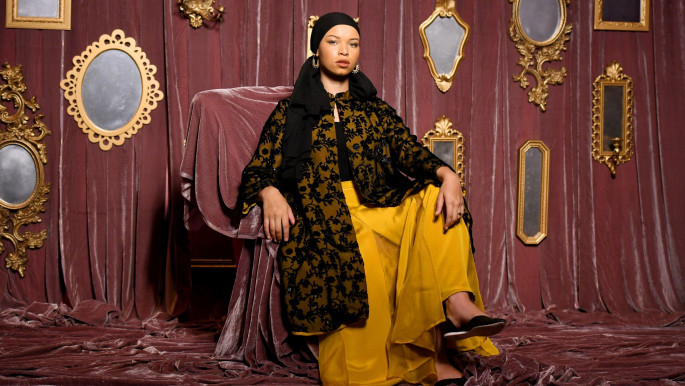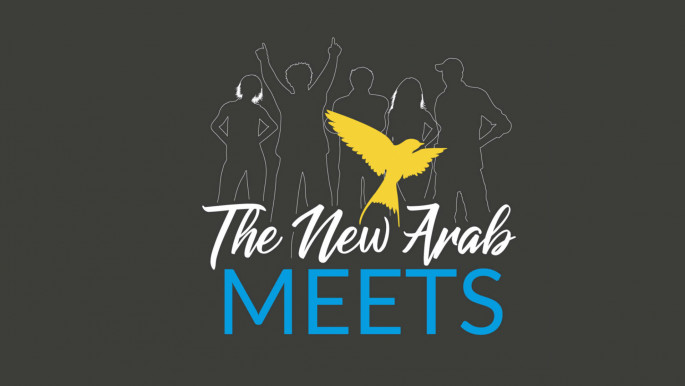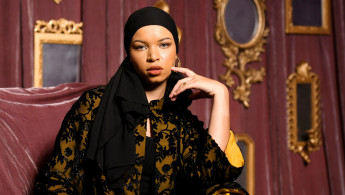Blair Imani: Queer, Muslim and BLM activism in a Trumpian America
The New Arab Meets: Blair Imani, the 26-year-old powerhouse balancing authorship and activism in a heavily divided, election-heavy America.
5 min read
Blair Imani is taking America by storm. [Getty]
Blair Imani is a queer, black Muslim activist and writer with a penchant for context.
As a historian, it naturally permeates her assessment of race relations in the United States, the upcoming elections and the acute danger US President Donald Trump poses to, well everyone.
"Donald Trump is a danger to Muslims," the 26-year-old author told The New Arab. "Donald Trump is a danger to disabled people, to black people, indigenous people, women, people of colour, those at the intersections, LGBTQ people.
"Donald Trump is a danger to himself. Donald Trump is honestly a danger to cis-gender white people. He's outright made Muslim bans. He's outright mobilised through his rhetoric, the hatred of Muslims."
Blair's words ring painfully true as the US braces for an election result that is less than a week away and is sure to set the country on fire.
Joe Biden, supported by former president Barack Obama, has taken up the Democrat mantle against a polarising Trump, under whose watch the country experienced police violence against black people, racism, and rampant Islamophobia.
Blair, who grew up in California and went to university in Louisiana, says she is no stranger to the annals of history. "Regardless of how the selection pans out, there will be a lot to reckon with," she said.
"We have to reckon with how we got here so we never get here again [and] without context, you have the issue where people in privilege and people who are oppressed are led to believe that the conditions of their oppression just are, instead of where it came from.
"And that's where I try and plug in to bridge that gap."
Early activism
Blair's activism began in summer camps in the US and graduated to LGBTQ activism at Louisiana State University, both of which were formative in her understanding of social justice.
"I had a massive awakening to university in Louisiana. It made me aware of life outside myself and gave me a profound reverence for what people are going through," she told The New Arab.
|
"He is a terrible person," she recalled. "I had fully forgotten that I was on camera, he had said I couldn't speak on certain communities and I had to correct him. 'Actually in addition to being a Muslim women, I am also a black queer person.' The shock on his face."
"I was concerned [that] me coming out put pressure on other people to come out. It speaks to privilege. I am protected from horrible systems, and your queerness is valid whether or not you're out."
"Being Muslim and Queer isn't something to be reconciled," she went on to add, speaking of her experience with a religion she was not born into, but that she embraced in 2015.
"If we understand the gender binary and heteronormativity as a means to an end – that end being capitalism – then we can understand that of course these institutions will espouse these things because it serves their interests.
"In the US so often we'll have LGBTQ groups that say things like, 'Oh, it's so difficult for people in the Mid East' - which is not a continent. So hard over there in Blank-istan.'
 |
Donald Trump is a danger to disabled people, to black people, indigenous people, women, people of colour, those at the intersections, LGBTQ people |  |
"When I came out people would send me violent images of people being thrown from roofs for being gay. It's truly horrid. Liberal people were sending this to me like, 'You shouldn't be a Muslim, look how hard it is for you.' And it's like I don't see anyone oppressing me but you in my DMs."
"A big thing that drew me to Islam is the democratisation of God. We all have our personal relationship with God. Hegemony is so against Islam."
#BlackLivesMatter
 |
| Blair is a well-known BLM activist [Getty] |
In 2016 a black man called Alton Sterling was shot dead at close range by two Baton Rouge Police Department officers.
In March 2020 an unarmed African-American woman called Breonna Taylor was shot and killed in her Louisville home by police; two months later another unarmed black man, George Floyd, was killed after a white police officer knelt on his neck until he died.
Blair was there for all the protests that came out of those terrible deaths, and she felt the growing frustration among people against a system that seemed designed to harm rather than protect.
"The biggest thing is that this is how the system works," she said. "It is sobering, but as a black woman who studies history, it's not surprising. The system that killed her [Breonna Taylor] is now supposed to do right by her? How? So when you start from that premise, it gives you a different movement forward.
"It's to understand that the system must change – it resulted in her death, but it cannot result in her justice if it killed her."
In her customarily historian's approach, Blair insists that in order to dismantle the system, people need a "multidisciplinary approach".
"We need to have so many different approaches; we continue to mobilise through voter registration, to fight voter suppression, to organise and do direct aid campaigns, to have mechanisms like, 'Oh there's police in the area, here's how you can be protected, here's alternatives to policing, here's how we can ensure our communities are made safe by each other, not by a system that was created to be violent to us.
"It is illuminating, the amount of people surprised by this. If you see how something has panned out time and time again and you're expecting a different result, have you truly been paying attention or are you going forward with reckless optimism?"
Imani Blair is the author of two books; Modern HERstory: Stories of Women and Nonbinary People Rewriting History, and Making Our Way Home: The Great Migration and the Black American Dream.
You can find her on Twitter: @BlairImani and Instagram: @BlairImani
Narjas Zatat is a staff writer at The New Arab. Follow her on Twitter: @Narjas_Zatat
Read more from The New Arab Meets special section below:
 |
|





 Follow the Middle East's top stories in English at The New Arab on Google News
Follow the Middle East's top stories in English at The New Arab on Google News


